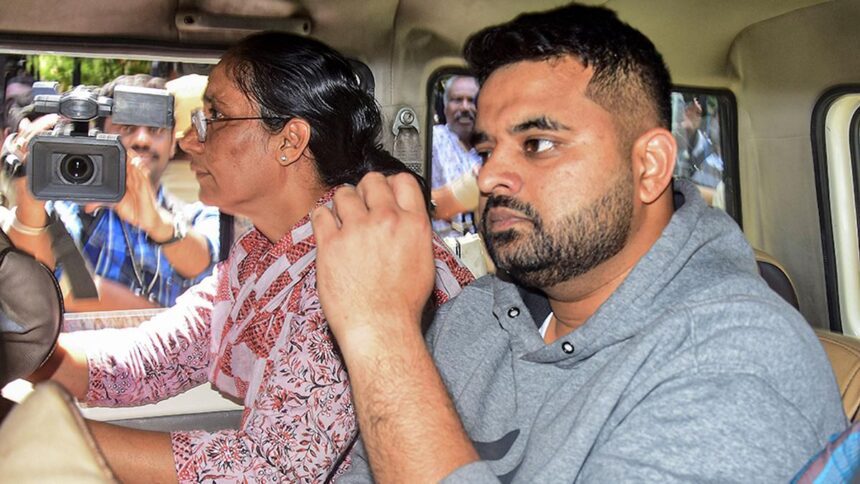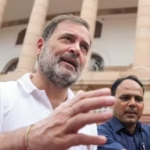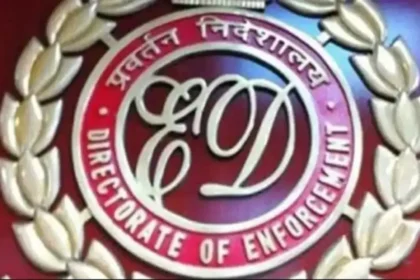From Political Dynasty to Courtroom Verdict — The Rise and Fall of Prajwal Revanna
The Indian political landscape has often witnessed dramatic downfalls — tales where legacy, lineage, and influence failed to shield individuals from the law. One such case that has recently shaken Karnataka’s political corridors is the conviction of Prajwal Revanna, a former Member of Parliament (MP) from Hassan and scion of the powerful Deve Gowda family, in a rape case. On the surface, it is a legal proceeding. Beneath, it is a complex intersection of power, privilege, politics, and justice.
On July 30, 2025, a special court in Bengaluru pronounced Prajwal Revanna guilty in a criminal case involving rape, criminal intimidation, and illegal surveillance, marking a turning point not only in the career of the young politician but in Karnataka’s socio-political narrative. Once projected as a promising face of the Janata Dal (Secular) — or JDS — Prajwal is now at the heart of one of the most high-profile criminal convictions of a sitting or former MP in recent times.
This article is a comprehensive, multi-part exploration of the case — its origins, legal journey, political implications, societal reactions, and what it means for the future of dynastic politics and gender justice in India.
🧬 The Legacy and the Man
To understand the shockwave this conviction has sent through political circles, one must first understand who Prajwal Revanna is.
Born into one of Karnataka’s most influential political families, Prajwal is the grandson of former Prime Minister H.D. Deve Gowda, and the son of H.D. Revanna, a senior JDS leader and former minister. The Revanna family is not only politically entrenched but also commands significant influence in Hassan district, a long-standing JDS bastion.
In 2019, amid rising demand for a younger face in regional politics, Prajwal was elected to the 17th Lok Sabha from Hassan. He was seen as the torchbearer of the JDS legacy, carrying forward his grandfather’s political vision. At 32, with a degree in engineering and a campaign focused on rural development and youth empowerment, Prajwal appeared to represent a generational shift in the otherwise aging political framework of the JDS.
But behind the optics of youth leadership and grassroots politics, a darker reality was taking shape.
⚖️ The Allegations Surface
The first formal complaint against Prajwal Revanna came to light in early 2024, when a woman from Hassan filed a First Information Report (FIR) alleging rape, criminal intimidation, and sexual harassment.
According to the complainant, the accused used his political influence and private security setup to stalk, intimidate, and coerce her into a sexual relationship under the false promise of marriage and professional advancement. The complaint also accused Revanna of installing hidden cameras to record intimate moments and using the footage to threaten her into silence.
What started as a solitary complaint soon snowballed into multiple accusations. Over the next few months, at least five women came forward with similar accounts — alleging a pattern of abuse, digital surveillance, and threats. One case involved a former party worker, another a journalist, and yet another a student intern from Bengaluru.
The allegations ranged from non-consensual acts to digital blackmail. And as details emerged in court documents and media investigations, a disturbing picture of systematic sexual exploitation and misuse of power began to take shape.
🧑⚖️ Legal Grounds — Charges and Proceedings
In April 2024, the Karnataka police registered a detailed chargesheet under multiple sections of the Indian Penal Code (IPC):
- Section 376 – Rape
- Section 354C – Voyeurism
- Section 506 – Criminal intimidation
- Section 67 IT Act – Publishing or transmitting obscene material in electronic form
The Karnataka State Commission for Women, in coordination with cybercrime officials, also launched a parallel investigation into the allegations of illegal digital surveillance and privacy breaches.
Prajwal was initially denied anticipatory bail, leading to his arrest in May 2024. The arrest was politically explosive. He was taken into custody amid high security from his residence in Hassan and brought to Bengaluru for interrogation.
Public reaction was divided: while civil society groups praised the action, JDS supporters claimed political vendetta. However, the evidence recovered — including video clips, chat transcripts, and financial records — made it clear that this was no mere political hit job. The trial began in late 2024 and was fast-tracked due to the seriousness of the charges and pressure from women’s rights groups.
🏛️ The Political Fallout
The Revanna family’s influence began to fracture under public scrutiny. JDS leadership, including H.D. Deve Gowda himself, issued a measured statement distancing the party from Prajwal’s actions, stating that “no one is above the law.” Yet, political damage was unavoidable.
- JDS’s 2025 Lok Sabha campaign suffered severely in Hassan, Mandya, and parts of Bengaluru rural.
- Allies in the INDIA bloc began questioning JDS’s credibility as a progressive, secular force.
- Opposition parties, particularly the Congress, launched blistering attacks, framing JDS as “protecting predators.”
Meanwhile, Karnataka’s BJP unit remained relatively silent, choosing not to politicize the case overtly — a decision many believe was tactical, aimed at preserving caste alliances in the Vokkaliga-dominated region.
For the first time, the dynastic cushion that had protected many in India’s political ecosystem seemed to be eroding in the face of judicial action and sustained civil society pressure.
🧠 The Verdict and Its Significance
On July 30, 2025, after nearly 14 months of investigation and trial, the Bengaluru Special Fast-Track Court for Women delivered its judgment.
- Prajwal Revanna was found guilty under Sections 376, 354C, and 506 of the IPC.
- The court cited conclusive digital and testimonial evidence, including messages, call recordings, and CCTV footage.
- He was sentenced to 20 years rigorous imprisonment, with additional penalties for IT Act violations.
In its written order, the court observed:
“The accused misused his political stature and digital resources to exploit, threaten, and violate multiple women. This conviction is not merely about one man’s guilt — it is a reminder that position must never eclipse justice.”
The ruling marked a watershed moment in Indian politics, especially in a country where many accused politicians manage to evade justice for years due to influence, loopholes, or delays.The conviction of Prajwal Revanna is not just the story of a fallen politician — it is a powerful statement about the changing climate in Indian judicial accountability, the impact of public pressure, and the courage of survivors to speak out against the powerful.
🧭 A Pattern of Predation — The Timeline of Events
While the formal charges against Prajwal Revanna began appearing in 2024, testimonies and case files indicate that his alleged misconduct may have started as early as 2019, shortly after his election to Parliament.
⚠️ Early Incidents (2019–2021)
- 2019–2020: A JDS party worker in Hassan complained informally about “inappropriate advances” by Prajwal. She was later transferred to another district post. No official complaint was filed.
- 2020: A 22-year-old intern from Bengaluru was allegedly invited to assist with social media operations, only to be subjected to harassment in a private farmhouse, per her later affidavit.
- 2021: A woman journalist covering a JDS event in Mysuru claimed Prajwal texted her repeatedly, eventually sending explicit content. She deleted the messages but retained screenshots, which became crucial later in corroboration.
At the time, none of these women filed police complaints. The fear of political retaliation, social shaming, and professional backlash loomed large.
🧨 Turning Point — Late 2023
The first major formal complaint came in November 2023, filed anonymously through a legal NGO. It included a detailed 11-page account of rape, coercion, and video blackmail, with references to locations, vehicles, security personnel, and more.
Once this reached the desk of Karnataka’s State Commission for Women, things moved swiftly:
- The Cyber Crime Cell traced IP addresses and matched digital signatures from Prajwal’s social media and messaging accounts.
- Hidden CCTV footage was recovered from two properties linked to Revanna’s close aides.
- Victim testimonies were video-recorded under Section 164 of CrPC, giving them legal protection from coercion.
By January 2024, four more women had filed affidavits or direct complaints.
👩⚖️ Survivor Testimonies — Stories That Refused to Be Silenced
Each survivor’s story is different, but common threads emerged: promises of career advancement, emotional manipulation, digital threats, and the looming shadow of political power.
Survivor A — A Grassroots Organizer from Hassan
A young woman working with JDS’s youth cell, she described how Prajwal isolated her under the guise of offering a higher post, eventually sexually assaulting her in a private guest house. When she protested, he reportedly threatened her family using local police contacts.
“For two years, I walked around with a smile and shame that wasn’t mine,” she said in court. “Today I speak not because I’m brave — but because I’m done being afraid.”
Survivor B — A Freelance Journalist
This survivor documented her harassment through screenshot archives, date-stamped WhatsApp backups, and witness statements from colleagues.
“He thought being powerful made him untouchable. But power doesn’t erase evidence.”
Survivor C — A Law Student Intern
Perhaps the most detailed testimony came from a woman who interned under Prajwal’s legal outreach initiative. She presented USB drives and hidden audio recordings of threats and conversations — material that became central to the conviction.
Her voice in court was unwavering:
“He said no one would believe me. That I was ‘just a girl’ and he was a future CM. Well, here we are.”
These women were supported by legal aid organizations, mental health counselors, and survivor networks that shielded them from media trials, preserving the integrity of the investigation.
🕵️The Role of Investigative Journalism and Whistleblowers
In India, where many political scandals go unreported or get buried under influence, the media played a crucial role in this case. However, it wasn’t the national TV networks — but regional reporters, digital outlets, and citizen journalists who exposed the rot.
📰 Breakthrough Coverage by “Karnataka Chronicle”
A local digital news portal, Karnataka Chronicle, published a five-part exposé in January 2024 titled “Inside the Revanna Ring: Testimonies of Power and Silence.” It included:
- Interviews with former JDS office staff
- Leaked internal communications
- Visual evidence of unregistered guest houses used during “party retreats”
The series created public outrage and forced the Karnataka police to form a multi-agency Special Investigation Team (SIT).
🕵️ Whistleblowers Within JDS
Two former staffers — one female administrative secretary and one male driver — came forward to submit affidavits under whistleblower protection. They provided logistical data: travel logs, security staff shifts, and confidential meeting records.
Their courage added legitimacy to the women’s claims and debunked the narrative that the accusations were fabricated or politically motivated.
🔐 Digital Evidence — The Trail That Couldn’t Be Erased
In a world ruled by data, what ultimately sealed the case was the digital evidence recovered by forensic experts:
- Over 3,000 messages from secure messaging platforms
- Hidden camera feeds auto-backed up to cloud servers
- Payment histories linked to ride-hailing and hotel bookings
- Deleted files retrieved from burner phones allegedly used for surveillance
The Karnataka Cyber Crime Cell worked with national agencies to crack encrypted backups, match metadata, and reconstruct timelines.
One of the most damning pieces of evidence was a recovered hard drive containing a folder labeled “PROJECT VIEWS,” which had subfolders of videos, some dated as far back as 2020.
The journey from whispers to verdict was not quick, easy, or safe. It required grit from survivors, courage from insiders, and diligence from reporters and investigators who refused to let the system look away.
This part of the story isn’t just about criminal acts — it’s about the institutional awakening that made a conviction possible. In a political culture where scandals often fade, this one stayed — thanks to the persistence of those who refused to forget.
🏛️ Chapter 10: The Beginning of Legal Proceedings
By March 2024, the Karnataka Police filed a comprehensive 2,200-page chargesheet before a Bengaluru sessions court. It included:
- Statements from six primary survivors under Section 164 of the CrPC
- Testimonies from 18 witnesses, including former staffers and hotel managers
- Forensic evidence including video recordings, call records, payment logs, and recovered metadata
- Medical reports corroborating instances of physical assault
The court ordered the framing of charges under:
- IPC Section 376 (rape)
- Section 354 (assault or criminal force to woman with intent to outrage modesty)
- Section 506 (criminal intimidation)
- IT Act violations for digital surveillance and distribution of explicit content
Prajwal Revanna was taken into judicial custody after his anticipatory bail plea was rejected twice — once by the Sessions Court and later by the Karnataka High Court.
The trial began in May 2024, under a fast-track POCSO & Women Atrocities Court in Bengaluru. Public interest was immense — but proceedings were held in-camera to protect the identities and privacy of survivors.
⚖️ Chapter 11: The Trial — Arguments, Defense Strategy, and Turning Points
Prajwal’s legal team, backed by top criminal lawyers from Delhi and Bengaluru, adopted a three-pronged defense:
- Denial of Consent: Argued that alleged encounters were consensual.
- Digital Tampering: Claimed videos and messages were “deepfaked” or “selectively edited.”
- Political Conspiracy: Alleged that the case was orchestrated by rival parties within Karnataka to destroy the Revanna family’s political capital.
But the prosecution, led by Special Public Prosecutor Radha Krishnamurthy, dismantled this narrative piece by piece.
💡 Key Turning Points:
- A digital forensics expert from Delhi testified under oath that “metadata timestamps and device footprints confirm authenticity of seized videos.”
- Witnesses presented corroborative diaries, travel logs, and even Uber receipts linked to the dates of assault.
- One survivor broke down while narrating her trauma but persisted, saying: “He filmed me crying. I want you to see it too. I want you to feel what I felt.”
The cross-examinations were intense but handled with sensitivity by the bench. The court refused to allow any “character assassination” tactics often employed in such high-profile cases.
📢 Chapter 12: The Public and Political Reaction During the Trial
The trial triggered waves of reaction across Karnataka:
🗳️ Within the JDS:
- While H.D. Deve Gowda maintained silence initially, he later issued a statement disassociating the party from Prajwal Revanna’s actions.
- H.D. Kumaraswamy, Prajwal’s uncle, appeared emotionally conflicted. “Let the law take its course. No man is above the constitution.”
Privately, reports suggested major rifts within the family, with several leaders pushing for Revanna to be formally expelled from party ranks.
👥 Among the Public:
- Women’s groups, students, and activists held solidarity marches in Bengaluru, Hassan, and Mysuru.
- Hashtags like #JusticeForSurvivors and #ShameOnDynasts trended for weeks on social media.
- TV debates oscillated between supporting the survivors and scrutinizing the misuse of power in Indian political families.
This trial began morphing from a criminal case into a referendum on political accountability.
⚔️ Chapter 13: The Verdict — Conviction and Sentencing
On July 25, 2025, after over 32 hearings and six months of arguments, the Bengaluru fast-track court delivered its historic verdict.
Presiding Judge Meera Chitale read out the judgment in a packed courtroom:
“This court finds the accused, Prajwal Revanna, guilty under Section 376, 354, and relevant sections of the IT Act. The evidence is overwhelming, credible, and consistent. The survivors have shown exceptional bravery. Their truth has prevailed.”
🧾 Sentence:
- 20 years of rigorous imprisonment under Section 376
- Additional 5 years under the IT Act for digital blackmail
- ₹50 lakh compensation each to three key survivors under the Victim Compensation Scheme
The courtroom erupted into sobbing and applause. Survivors hugged their lawyers. Media outlets, long kept at bay, rushed to report the breaking news.
Outside the courthouse, candlelight vigils were held. Activists called the ruling a “landmark conviction against political impunity.”
🔍 Chapter 14: The Fallout — What This Means for Karnataka and Beyond
The conviction of Prajwal Revanna sent shockwaves not just through JDS, but across India’s political spectrum.
🧨 Dynastic Disgrace
Revanna is part of one of Karnataka’s most powerful families, often called the “Gowda Dynasty.” His conviction marks:
- The first major conviction of a serving or recently serving MP for rape in modern Karnataka history
- A public and political defeat for dynastic impunity, where families often close ranks to protect their own
📉 Electoral Consequences
Political analysts predict this will have direct implications on JDS’s future:
- Voter backlash expected in Hassan, Mandya, and Bengaluru Rural constituencies
- JDS may lose coalition leverage in upcoming state elections
- Both BJP and Congress have already begun repositioning themselves as “pro-women safety” champions
🛡️ Systemic Ripples
- Karnataka’s Women & Child Development Department proposed a statewide helpline for political interns and party workers.
- The High Court ordered a review of police inaction on past complaints involving political persons.
- The conviction is likely to set a judicial precedent for evidence handling in digital abuse cases.
The court’s decision may have brought a sense of legal closure, but the broader reckoning is only beginning. India is a country where political power often buys silence. But here, that silence was shattered by voices that refused to be intimidated.
This part of the story is about more than just one man’s guilt — it’s about the reclamation of dignity, justice, and the law’s moral compass. Prajwal Revanna’s fall from grace will remain etched in Karnataka’s political memory for years to come.
Also Read : Russia Strikes Kyiv: 13 Killed, 130+ Injured in Brutal Missile & Drone Attack — Deadliest Since March








